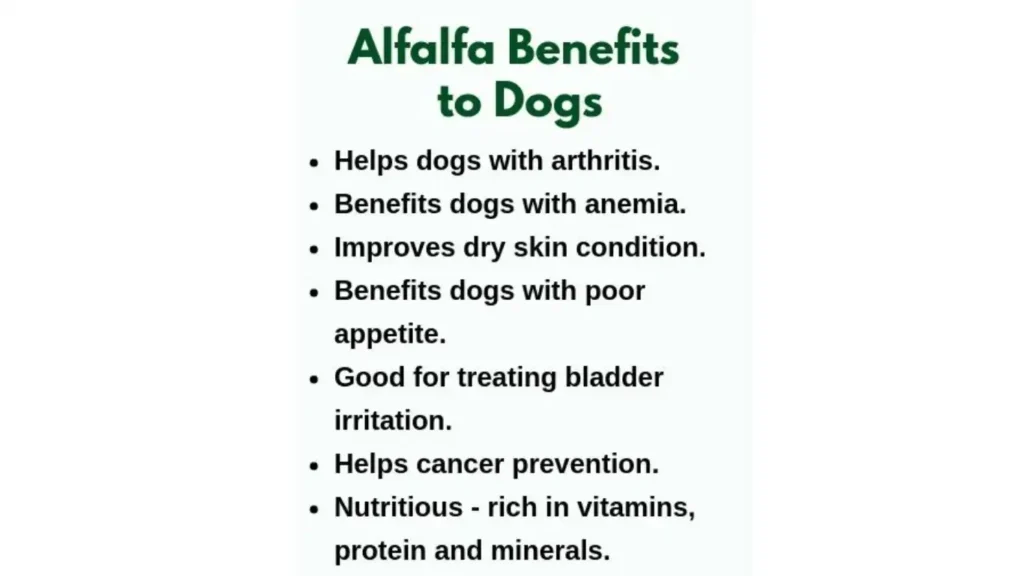Alfalfa For Dogs – Unlocking Surprising Benefits & Risks!
A nutrient-dense ‘superfood’ that is gaining popularity among dog owners looking for natural products to feed their pets to help them live a more healthy life. And what makes alfalfa good for dogs?

Alfalfa for dogs can support your dog’s wellness journey from joint support to digestive health. In this article, we’ll cover the benefits of it, how to safely include it in your dog’s diet, the dosage, and the potential risks.
Benefits of Alfalfa for Dogs
Alfalfa provides a variety of nutritional qualities including vitamins A, C, K, calcium, magnesium, and protein.

These contribute to a dog’s overall health in several ways:
- Supports Bone Health: Alfalfa for dogs is perfect because it contains calcium and vitamin K, both of which are really important for strong bones.
- Aids Digestion: It contains fiber that can keep your digestive system healthy.
- Boosts Immune System: Besides being rich in antioxidants and vitamins, alfalfa also aids in strengthening immunity.
- Anti-Inflammatory Properties: Natural and mildly beneficial anti-inflammatory properties help alfalfa with dogs with joint issues.
Is Alfalfa Safe for Dogs?
Certainly, alfalfa is typically safe for dogs when given in moderation. For centuries it’s been used as a medicinal herb, and it’s also used in a lot of dog food brands themselves.
But, like any new supplement, it’s important to add alfalfa gradually to avoid any problems with your dog’s system. Alfalfa is fine for most dogs, although some dogs may be sensitive and you may even see that they have adverse reactions like digestive upset or allergy reaction to alfalfa.
Natural Supplements for Dogs
Alfalfa for dogs is part of a growing trend of natural dog health supplements. Some pet owners turn to alfalfa because it abundantly provides an essential source of nutrients. Natural supplements such as alfalfa provide whole food nutrition as compared with synthetic vitamins and it is therefore a preferred choice for dogs with different health needs.

Alfalfa in Dog Food
Alfalfa for dogs is used in many commercial dog foods, mostly those that concentrate on natural ingredients, as a source of vitamins and minerals. A small amount is often added to increase the nutrient density while the texture or flavor of the food is not affected. Glucosamine (which helps to support joint health and mobility), along with alfalfa, is particularly common in senior dog foods.
Alfalfa for Dog For Joint Health
It’s commonly given for its joint-supportive properties in older dogs prone to arthritis. It’s an anti-inflammatory herb and makes an excellent herb for reducing joint pain and increasing flexibility. Alfalfa, when combined with other joint-supportive supplements such as glucosamine and chondroitin, can add additional joint support for a dog with arthritis or joint pain.
Can Dogs Eat Alfalfa Sprouts?
Alfalfa sprouts, or the young seedlings of alfalfa plants, are safe for dogs and have a similar nutrient profile to mature alfalfa. Sprouted seeds are easy on the tummy and a great way to give your dog some extra goodness in their food! In fact, however, make sure the sprouts are fresh and free of mold or pesticides to avoid a health risk.
Alfalfa Supplements for Dog Health
If you are looking for alfalfa for dogs as a supplement you will find it in tablet, powder, or capsule form. If your dog doesn’t get all the nutrients they need from food alone, alfalfa supplements can be very beneficial. Talk to your vet about how and at which dosage you should give alfalfa to your dog to maximize its positive effects.
Alfalfa Benefits for Dog Digestion
Dietary fiber is something Alfalfa is excellent at, and can assist you in digestion and regulate bowel movements. Yeah, it’s important for a healthy gut, and feeding your dog some alfalfa may help keep those issues like constipation or bloating at bay. It is also known to help breath freshen with its chlorophyll content and also cleanse the digestive tract.
How Much Alfalfa is Safe for Dogs?
How much alfalfa you give a dog depends on the dog’s size, weight, and state of his health. Normally, most dogs can eat safe amounts of alfalfa or dried alfalfa powder as a general rule, but beware of toxic amounts of alfalfa. For alfalfa supplements, use the product, or your vet’s, recommended dosage, or how much is too much causing digestive upset, or causing some medications to not work as well.
Anti-Inflammatory Herbs for Dogs: Alfalfa
A well-known herbal supporter of joint health is alfalfa, which has natural anti-inflammatory properties. In the interest of caution, a safer approach is to mix alfalfa with turmeric or ginger, or other anti-inflammatory herbals such as Chile pepper and ginger, for a natural treatment for dogs with inflammation or pain due to arthritis, an injury, or other disease.
The Role of Alfalfa in Dog Nutrition
Alfalfa means the vitamins and minerals will be present in special concentrations to aid many different aspects of canine health. Alfalfa also provides protein and antioxidants that are key in maintaining a healthy immune system, as well as more calcium, magnesium, and vitamins A and K. Alfalfa, if added to a balanced diet, can provide for your dog essential nutrients that it might otherwise miss.
Potential Side Effects of Alfalfa for Dogs
Alfalfa is safe for dogs in small amounts, but you should be aware of some potential side effects if your dog consumes too much of this food. Long-term overdose of many of these plant parts results in digestive troubles such as gas, bloating, or diarrhea. Alfalfa also contains phytoestrogens, which may not be appropriate for pregnant dogs, or dogs with hormone-sensitive conditions.
Choosing Alfalfa Products for Your Dog
If you’re choosing alfalfa products, go with organic or high-quality supplements to make sure your dog is getting pure alfalfa without additives or pesticides. Find brands that have been third-party tested for purity and potency. If you’re doing the alfalfa thing for your dog, it’s best to seek advice from your veterinarian about what type and how much to feed.
Conclusion
If you have an alfalfa-loving dog, including alfalfa in their diet can be a great addition — it will provide essential nutrients, aid digestive health, have anti-inflammatory properties, and support joint health. As long as they are given mindfully and in moderation, alfalfa can actually provide your dog with better well-being and a better quality of life. As a general rule, consult your vet if you start the supplements before knowing if they are suitable for your pet’s needs.
Frequently Asked Questions
How much alfalfa should I give my dog?
For the added health benefits without the risks add about 1 teaspoon of powder for every 50 pounds of dog food. When you aren’t using it for compost tea, you can store the remaining ground alfalfa in a Ziploc bag until next time. If your dog likes the taste of alfalfa, then you can let them just eat it whole in small amounts every few days as a treat.
What are the benefits of alfalfa?
Alfalfa can have antioxidants that could help fight free radicals and might help protect your body against those diseases. Alfalfa is a fiber-rich food. Slowing the speed at which glucose (blood sugar) is absorbed into your gut may help control blood sugar levels.
Why is alfalfa meal in dog food?
Rich in both protein and fiber, both of which can help with digestion making you feel full sooner. It contains vitamins and minerals like calcium, phosphorus, and potassium.
Can too much alfalfa cause diarrhea?
As the protein levels increase and as the stem size decreases, the risk of bloat/diarrhea increases. Too much of the alfalfa can make beef overweight. It works great in the dairy, as it promotes milk production if you aren’t trying to put a cap on how much your cow produces.
How long does it take for alfalfa to work?
It’s generally safe to expect some positive effects after about 3–7 days from the moment you begin taking alfalfa seed extract.
